By Mark Wright, OD, FCOVD
and Carole Burns, OD, FCOVD
Feb. 22, 2017
Your best opticians can be lured away by the competition. Here’s what your peers are paying their opticians, according to Jobson Optical Research’s 2016 ECP Compensation Study. The average compensation reported for all opticians/dispensers responding to the study was $46,024. The median compensation for the same group was $42,336. The Northeast had the highest average compensation at $53,996. The South and West average compensation was $44,823 and $46,344 respectively. The Midwest was the lowest at $40,146.
Click HERE to purchase Jobson Optical Research’s 2016 ECP Compensation Study.
Is your compensation package for optician positions requiring similar levels of expertise and experience competitive? Paying your staff too much or too little can hurt your practice. If you pay too little, staff will leave you for a higher offer. That results in loss of productivity, increased cost of hiring, increased cost of training, combined with the chaos that being short-staffed causes. Paying staff too much hurts the profit of the practice and limits the ability to hire additional staff so that you can maintain high-quality patient care. Finding that compensation sweet spot for your opticians requires some work, but is definitely worth the effort.
Let’s start with the information from Jobson Optical Research’s 2016 ECP Compensation Study and see what other tools can help us find the right compensation for our opticians. A great place to go to is the United States Department of Labor Bureau of Labor Statistics web site. This web site gives percentile wage estimates for Dispensing Opticians. Here’s the chart and definition of Annual Wage from that web site for Dispensing Opticians.

(2) Annual wages have been calculated by multiplying the hourly mean wage by a “year-round, full-time” hours figure of 2,080 hours; for those occupations where there is not an hourly wage published, the annual wage has been directly calculated from the reported survey data.
Note that the median wage from Jobson Optical Research’s 2016 ECP Compensation Study is $42,336, and the median wage from the Bureau of Labor Statistics is $34,840. The Bureau of Labor Statistics only lists Dispensing Opticians and does not include a filter for Licensed Opticians. That could explain the difference.
Wages for opticians varies across the country. This is a screenshot from the Bureau of Labor Statistics for Dispensing Opticians.
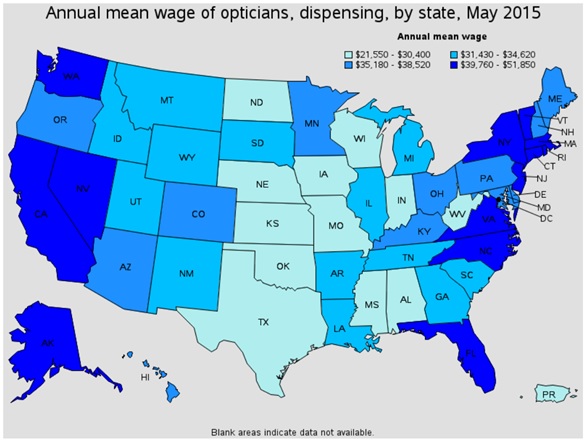
Another example of a helpful web site is payscale.com. Here is a screenshot of Opticians Salary (United States) from that web site. The range in total annual total pay is from $22,333 to $49,861.
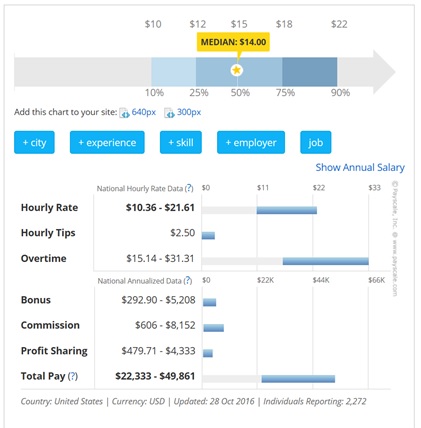
Note that you can filter this information based on city, however, the city choices are limited. Here are your possibilities without purchasing a Personalized Salary Report.
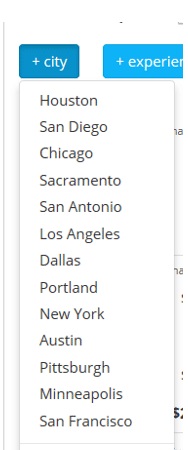
Let’s choose Houston, and compare those results to Pittsburgh. Here are Houston’s results.
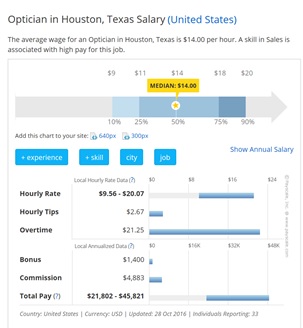
Here are Pittsburgh’s results.
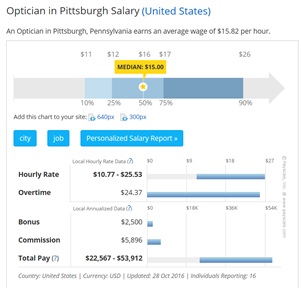
The range for Houston is $21,802-$45,821, while the range for Pittsburgh is slightly higher at $22,567-$53,912.
But not all opticians have the same skill level. The expectation is that a licensed optician should have a higher pay. Indeed, the next chart is that same web site listing the total annual pay for a Licensed Optician as between $31,016 and $59,216.
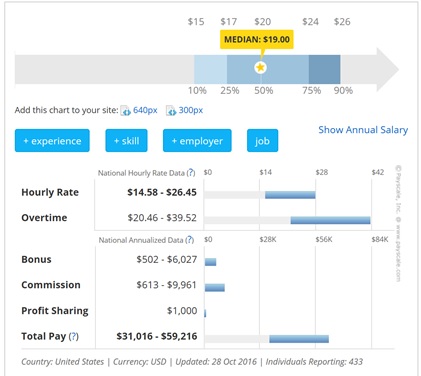
Web sites such as these allow you to add experience filters such as Entry Level, Mid-Career, Experienced and Late-Career. Here’s what that looks like for a Licensed Optician, Late-Career.
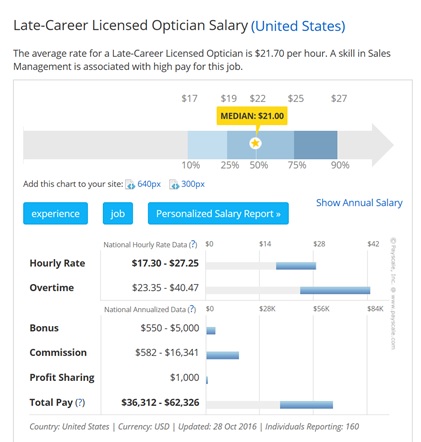
As you would expect, the annual Total Pay has increased to $36,312 – $62,326.
As we research comparable wages for the specific type of optician, for area of the country, for the city, and for experience, we have to keep in mind that money is only one factor for employment – and it may not be the most important factor. Don’t overlook the power of a benefits package. It’s also important to know why employees leave jobs. The article Top 10 Reasons Why Employees Quit Their Jobs by Susan M. Heathfield says the reasons are:
1. Relationship with boss
2. Bored and unchallenged by the work itself
3. Relationships with co-workers
4. Opportunities to use skills and abilities
5. Contribution of work to the organization’s business goals
6. Autonomy and independence
7. Meaningfulness of job
8. Organization’s financial stability
9. Overall corporate culture
10. Management’s recognition of employee job performance
Take this week to review your total compensation package for your opticians. Make sure you consider office culture at the same time because you want to keep your well trained, productive staff.
References
i. United States Department of Labor Bureau of Labor Statistics
iii. The Balance: Top 10 Reasons Why Employees Quit Their Jobs



























